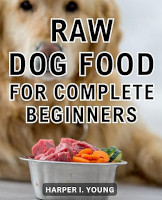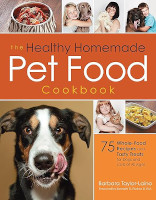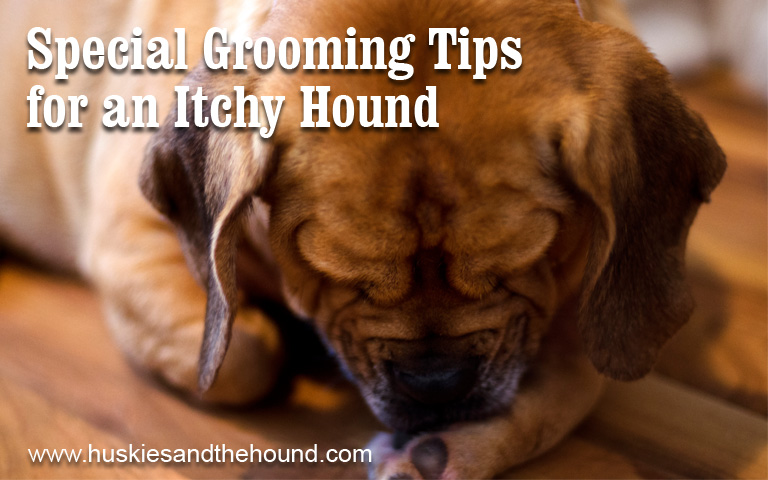
Our basset hound/pug mix, Snoopy, has a few skin issues that took some time to heal. We learned a few things when trying out different ways to fix his itchy skin problems. While our methods may have worked for Snoopy, keep in mind that every dog is different, and what worked for Snoopy may not work for your dog.
Is It Skin Allergies?
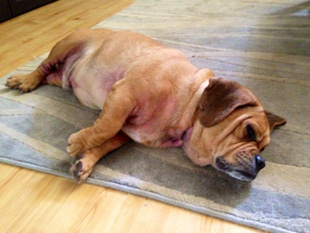 Living in Florida, it is hot and humid so the thought of allergies is pretty common in this state. On the really hot days of Snoopy running around outside and in the tall grass, he would get really red and itchy. He itches constantly and scratches himself until he bleeds. It has been a long, ongoing, constant battle with him to get him to stop itching. After many years of scratching himself raw, he has lost hair on his neck to the point where a small patch is still bald. Poor Snoopy, I would have to bathe him in epsom salt to help calm the redness.
Living in Florida, it is hot and humid so the thought of allergies is pretty common in this state. On the really hot days of Snoopy running around outside and in the tall grass, he would get really red and itchy. He itches constantly and scratches himself until he bleeds. It has been a long, ongoing, constant battle with him to get him to stop itching. After many years of scratching himself raw, he has lost hair on his neck to the point where a small patch is still bald. Poor Snoopy, I would have to bathe him in epsom salt to help calm the redness.
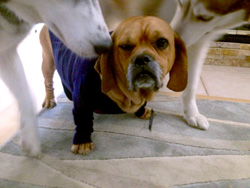 In my foolish attempts to prevent the grass and pollen causing skin irritations when in contact with his skin, I put Snoopy in a baby onesie. My husband laughed at me and called me "crazy". Ok ok, I have to admit it does look quite silly now that I see it. Even the dogs had a good laugh! Ha. And no, this did not help with Snoopy at all and he was not amused with the onesie. Hehe. After taking him to the vet, we discovered the cause of all of Snoopy's skin problems...
In my foolish attempts to prevent the grass and pollen causing skin irritations when in contact with his skin, I put Snoopy in a baby onesie. My husband laughed at me and called me "crazy". Ok ok, I have to admit it does look quite silly now that I see it. Even the dogs had a good laugh! Ha. And no, this did not help with Snoopy at all and he was not amused with the onesie. Hehe. After taking him to the vet, we discovered the cause of all of Snoopy's skin problems...
Seborrheic Dermatitis
Snoopy has a skin condition known as Seborrheic Dermatitis. What the heck is that? According to WebMD, seborrheic dermatitis is skin inflammation that is usually red and itchy and may create blisters. Seborrheic dermatitis creates greasy, yellow or red scaling on hairy areas of the body such as the scalp or genitals. This is exactly what Snoopy had before we found a solution. His skin gets greasy to the touch within 3-5 days and if left too long without a bath, he would start to get yellow scales on his body.
Natural Supplements
The hippy side of me wanted to try all natural ways to help cure Snoopy's skin issues. I researched many all natural alternatives such as coconut oil, honey, apple cider vinegar, salmon oil, fish oil tablets, the list goes on and on. I tried each and every all natural alternative for a few months at a time. I made sure to give each alternative a good amount of time to see if it worked - at least 3 months minimum. Unfortunately, none of them worked for the seborrheic dematitis, however all three dogs loved the extra treat! What may not have worked for Snoopy, may be worth a try for your pooch. Important: I encourage you to do your own research and speak with your veterinarian before trying any of these all natural options. Here are some of the products that I've tried over the years:
-
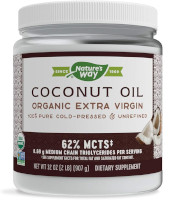 Nature's Way Organic Extra Virgin Coconut Oil - I used 100% virgin coconut oil and placed 1 teaspoon once a day with their meal. I simply mixed it in with the dog food and they gobbled the stuff up.
Nature's Way Organic Extra Virgin Coconut Oil - I used 100% virgin coconut oil and placed 1 teaspoon once a day with their meal. I simply mixed it in with the dog food and they gobbled the stuff up.
- 100% Pure local honey - Local honey is important for allergies since they contain the pollen local to your area. I added 1-2 teaspoons once a day with their meal.
-
 A good quality raw apple cider vinegar like Bragg Organic Raw Apple Cider Vinegar can be applied directly to itchy spots in a 50/50 solution of apple cider vinegar and water. You can also give your dog apple cider vinegar orally by adding it to their dog food. I would suggest feeding 1/4 to 1/2 teaspoon twice daily. Side note, giving this to them orally may or may not work because of the smell, they may be suspicious of you and not eat it (haha, my dogs were of me!)
A good quality raw apple cider vinegar like Bragg Organic Raw Apple Cider Vinegar can be applied directly to itchy spots in a 50/50 solution of apple cider vinegar and water. You can also give your dog apple cider vinegar orally by adding it to their dog food. I would suggest feeding 1/4 to 1/2 teaspoon twice daily. Side note, giving this to them orally may or may not work because of the smell, they may be suspicious of you and not eat it (haha, my dogs were of me!)
-
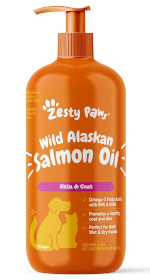 Salmon oil for dogs come in two ways: (1) Pump bottle,
such as the Pure Wild Alaskan Salmon Oil, or (2) Softgel tablets, such as Omega 3 Wild Caught Fish Oil 180 Softgels, 1000mg, per capsule. I actually do give this to all of my dogs on a daily basis. It helps keep their fur shiny and soft. I chose the capsules which are easy to toss into the bowl at feeding time.
Salmon oil for dogs come in two ways: (1) Pump bottle,
such as the Pure Wild Alaskan Salmon Oil, or (2) Softgel tablets, such as Omega 3 Wild Caught Fish Oil 180 Softgels, 1000mg, per capsule. I actually do give this to all of my dogs on a daily basis. It helps keep their fur shiny and soft. I chose the capsules which are easy to toss into the bowl at feeding time.
Raw Food Diet
Raw diets, (aka the BARF diet, an acronym that stands for Bones And Raw Food) are an alternative to dry dog food. They consist of various raw meats, bones, fruits, vegetables, and supplements. There are many dog lovers out there who recommend a raw food diet to cure any dog ailments, especially skin conditions. Personally, we didn't have the time or money to try this method our with 3 dogs. There is so much information out there about raw food diets for dogs. Here are some helpful links on the topic:
- Raw Food Diet Benefits and Risks
- 5 Mistakes People Make When Feeding Pets a Raw Food Diet
- Raw Dog Food: The Beginners Guide to Feeding Raw
- Should You Put Your Dog on a Raw Food Diet?
- The Feeding Mistake Linked to the Cause of Most Disease - Are You Making It?
Homemade Dog Food
An alternative to the raw food diet is home cooking for your dog. Home cooked meals for your dog can be a very healthy option if you know what to cook. You can check out some resources online, such as Homemade Dog Food is Healthy and Nutritious. I've tried quite a few recipes from some of the homemade dog food books, specifically looking for a cure for Snoopy. While Snoopy enjoyed them, they didn't do much for his dermatitis, even though some of them looked really healthy and nutritious for my dogs. While they turned out smelling good and the dogs loved it, they were quite time consuming. However if you have the time, I would give it a shot!
It is important to mention that you will need to pay attention to the ingredients to ensure your dog is getting the right nutrients in every meal. There should be a healthy balance of protein, carbohydrates, vegetables, fats, calcium and fatty acids. The recommended nutrition guidelines from the Canine Journal: 40% Protein – animal meat, seafood, eggs or dairy; 10% Carbohydrates – grains and beans; 50% Vegetables. Fat – from oil or meat; Calcium – crushed or powdered egg shells, a supplement; Fatty acids – cooked egg yolks, oatmeal, plant oils and other foods. Here are some books that I also recommend (I own them myself):
Resolution - How we fixed it
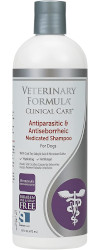 We use a special shampoo: SynergyLabs Veterinary Formula Clinical Care Antiparasitic & Antiseborrheic Medicated Shampoo At first when I tried this shampoo, I didn't find it every effective. Poor Snoopy was still itching like crazy and I tossed the bottle aside feeling defeated yet again. After a couple more months, I came across the shampoo bottle under the bathroom sink and decided to give it one more try. After reading the directions and following them thoroughly, I bathed Snoopy and let the shampoo stay on him for 10 minutes before rinsing it off. It took about 1 month to notice a significant improvement. Low and behold - he stopped scratching! It was like magic. Snoopy stopped itching. I couldn't believe it... purely amazing.
We use a special shampoo: SynergyLabs Veterinary Formula Clinical Care Antiparasitic & Antiseborrheic Medicated Shampoo At first when I tried this shampoo, I didn't find it every effective. Poor Snoopy was still itching like crazy and I tossed the bottle aside feeling defeated yet again. After a couple more months, I came across the shampoo bottle under the bathroom sink and decided to give it one more try. After reading the directions and following them thoroughly, I bathed Snoopy and let the shampoo stay on him for 10 minutes before rinsing it off. It took about 1 month to notice a significant improvement. Low and behold - he stopped scratching! It was like magic. Snoopy stopped itching. I couldn't believe it... purely amazing.
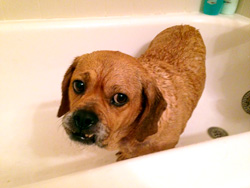 For maintenance, we continue to bathe Snoopy with this shampoo at least once a week. Unfortunately, this may be the only treatment we found that actually works and if we stop using it, his itching will come back. Justin found this out the hard way when he stopped bathing the dog for a month... and he scratched his neck bloody again. We will have to continue this routine for the rest of Snoopy's doggy life unless we find something else that works. For now, I'm happy to take 15 minutes out of my busy week to bathe my dog and keep him a happy little itch-free hound.
For maintenance, we continue to bathe Snoopy with this shampoo at least once a week. Unfortunately, this may be the only treatment we found that actually works and if we stop using it, his itching will come back. Justin found this out the hard way when he stopped bathing the dog for a month... and he scratched his neck bloody again. We will have to continue this routine for the rest of Snoopy's doggy life unless we find something else that works. For now, I'm happy to take 15 minutes out of my busy week to bathe my dog and keep him a happy little itch-free hound.
